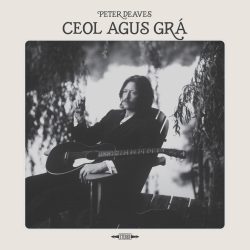A capable songwriter and musician courting praise from many quarters.
 Peter Deaves has swapped Liverpool for a more bohemian lifestyle in Fontainebleau. The years in Paris have been spent organising and performing at live music events. There’s a cool video out there of Deaves performing ‘Heaven Revisited’ somewhere palatial at a Sofar gig in the city. Location and company kept have inevitably influenced his self-image and style. But the scouse accent is still there, along with an exile’s rosy retrospection of home.
Peter Deaves has swapped Liverpool for a more bohemian lifestyle in Fontainebleau. The years in Paris have been spent organising and performing at live music events. There’s a cool video out there of Deaves performing ‘Heaven Revisited’ somewhere palatial at a Sofar gig in the city. Location and company kept have inevitably influenced his self-image and style. But the scouse accent is still there, along with an exile’s rosy retrospection of home.
The first track on this debut album certainly piques your interest. ‘Opening Night’ has Deaves singing with a deep mellifluous tone. It is performed as a duet with label companion, Bobbie. She has just released an impressively nostalgic album of her own called ‘The Sacred and the Ordinary’. Both voices complement each other beautifully, while the music could soundtrack any town’s vaudeville district. It’s a fine track.
‘The Long Green River’ veers into Marlboro Country. Deaves’ low baritone voice successfully bridges the change in direction, a track that could have come out the archives of The Johnny Cash Show. It is a clever take on the coming home theme. The town of champagne only meaning one place, it has warmth and humour, the soggy bottom-like backing adds to the enjoyment. Another out-and-out country track comes later on called ‘The Song Never Written’. “I hope you can forgive me/ I never meant to do you wrong/ I hope you can forgive me/ Even though I never wrote your song.” Again, very clever and there’s some wonderful pedal and lap steel accompaniment from Michael Benjelloun.
And then the first of a few curveballs. On ‘Falling’ his voice has risen. The mellifluous tone has gone. It is almost as if Deaves has been replaced with a high, nasally singer. ‘Falling’ is an oversweet song with the flaunty line, “Our Little Sejour”. It is quite disconcerting. ‘Gasoline’ is a good song but it is like nothing else on the album. Described as a Britpop compression, it’s more layers of Coldplay, Radiohead or Gary Go. Elsewhere, there’s a folk interlude, ‘Liverpool’ which is pretty self explanatory. It does have some interesting references to the Las and a political party that we can all agree to hate. ‘Bury Me Under the Mersey’ is a traditional ballad with a big nod to the Irish. It is an intentionally rousing sing-along with authentic tin whistle accompaniment by Fiachna Ó Braonáin. A swipe at the “Rich Assholes” doesn’t go amiss either. Deaves was recently invited on to the Saint George’s Hall stage in Liverpool by Glen Hansard to sing this track. That’s quite a homecoming.
Deaves is more on track with ‘Nowhere Boy’. After a short harmonica intro, the deeper voice reassuringly returns to deliver some fine lines and Fab Four references. “Took myself a wine loving lover/ Undying loyalty was my only crime/ We travelled the world but she left me for another/ Left me there just withering on the vine”. ‘My Oh My’ has a great double bass line from Clement Smadja. ‘Quarter Past’ has some beautiful piano playing from Sevan Gregoire. These songs have more than enough fine musicianship and words of love. There’s a very stylish video out there to accompany ‘Quarter Past‘. Deaves does seem to have a network of incredibly talented musicians, videographers, photographers and producers he’s befriended in Paris. The album has been recorded with care by those at Octopus Productions Studio.
Listening to an album with such eclecticism from start to finish might be a challenge to some. In the Sofar clip mentioned above Deaves performs ‘Heaven Revisited’. Like the stand out ‘Quarter Past’, it is Deaves at his most interesting and intimate. When he writes less obviously about his roots, resists the alt rock… folk… indie influence from home and sings in that mellifluous voice: his songs hold their own in the world.



Ó Braonáin. the fadas – the accents over the vowels – are important.
Thanks Stan. Didn’t mean to be disrespectful. Correction done.